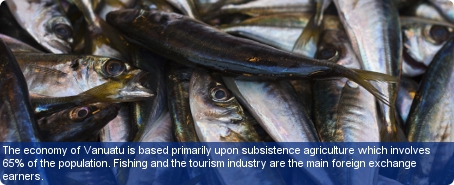Find a business in Vanuatu

The Vanuatu economy is primarily based on agriculture, fishing, tourism and offshore financial services. Much of the agriculture is subsistence farming and provides a living for about two-thirds of the population. Vanuatu has a GNI per capita of US$2,640 and a GDP growth of 5.3% per annum (2006-10). The archipelago of Vanuatu has traditionally had a very liberal financial regime and a strong private sector.
Vanuatu’s economy is primarily agricultural, contributing 19% of Vanuatu’s GDP along with forestry and fisheries in 2010. Cash crops include copra, cocoa, kava and cattle. Livestock plays a major role in Vanuatu’s economy, with beef being one of their main exports. The agricultural sector in Vanuatu has grown steadily since 2003 despite productivity and agricultural growth being limited by insufficient infrastructure and the effects of frequent natural disasters.
With some 2,500km of coastline, fishing has been an important historical source of income and nutrition in Vanuatu. However, Vanuatu’s domestic fishing industry is underdeveloped due to a lack of infrastructure and investment and there is evidence of over-exploitation of reef fisheries on the more urban islands. Offshore fishing is dominated by foreign fishing corporations and focused singularly on albacore tuna.
Tourism and Travel is another important sector and directly contributes 18.6% to Vanuatu’s GDP, generating 11,000 jobs – 16.4% of total employment (World Travel and Tourism Council, 2011).
Vanuatu has significant mineral resources including precious metals and manganese however the lack of stable infrastructure has made it difficult to support a large mining industry. There is also potential for deep-sea mining within Vanuatu’s large exclusive economic zone.
The country’s off-shore banking sector flourished initially but stricter regulation has seen activity in this sector decline sharply. During 2002 the government stepped up efforts to boost tourism by improving air connections, resort development, and cruise ship facilities.
Australia and New Zealand are the main suppliers of tourists and foreign aid.
Like most islands in the Pacific, there is no rail network in Vanuatu and transport by road is difficult. There are 1,070km of roads, 24% of which are paved, but they are mostly located on the island of Efaté. Transport by sea is considerably easier with two main international ports at Port Vila and Luganville that provide services for a number of shipping lines operating out of Australia, New Zealand and New Caledonia. There are two international airports, one located at Bauerfield, near Port Vila, and Pekoa on Espíritu Santo.
Vanuatu is ranked 32nd in the world for paying taxes, according to the World Bank’s ‘Doing Business 2012’ study. But it is ranked 9th in the East Asia and Pacific region for ease of doing business. These rankings measure the conduciveness of a regulatory regime in starting and operating a business.
Vanuatu has an adult literacy rate of 82% (2009). While Bislama is the first language of most people in urban areas, French and English are also official languages of Vanuatu and widely spoken among skilled workers. The majority of the labour force continues to work in agriculture but the services sector is growing steadily and accounts for 70% of GDP (2010).



